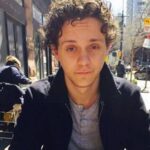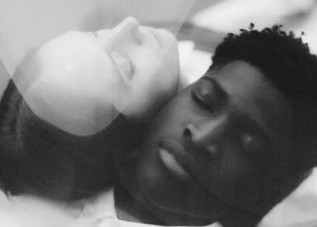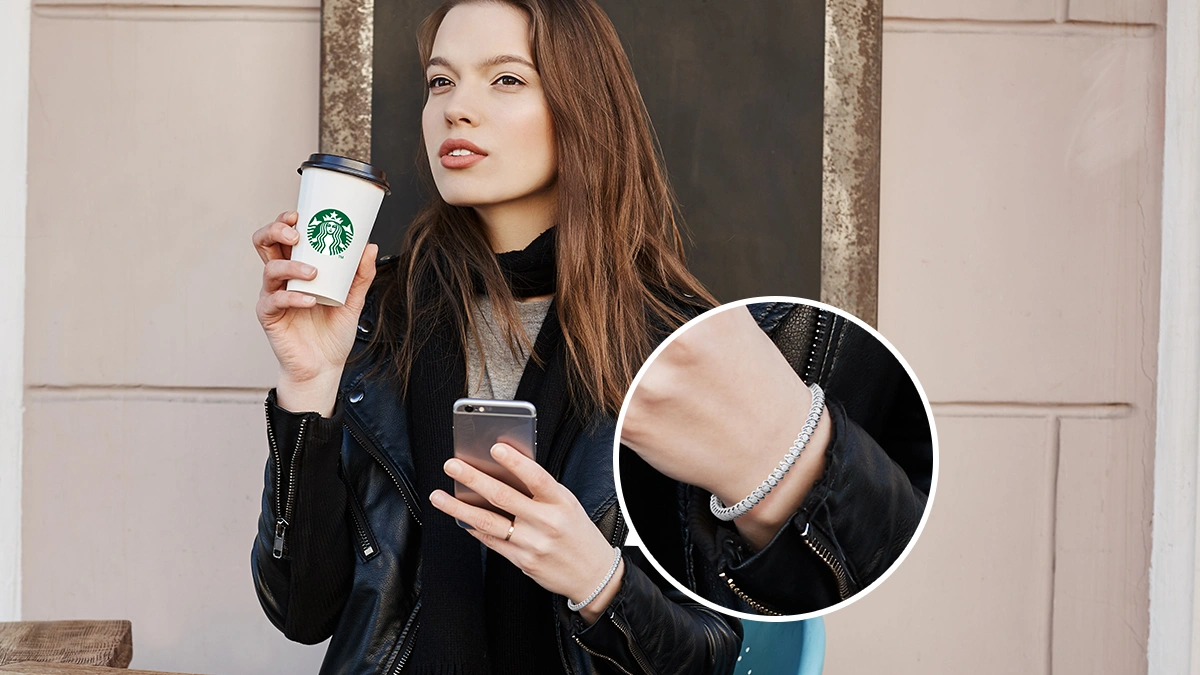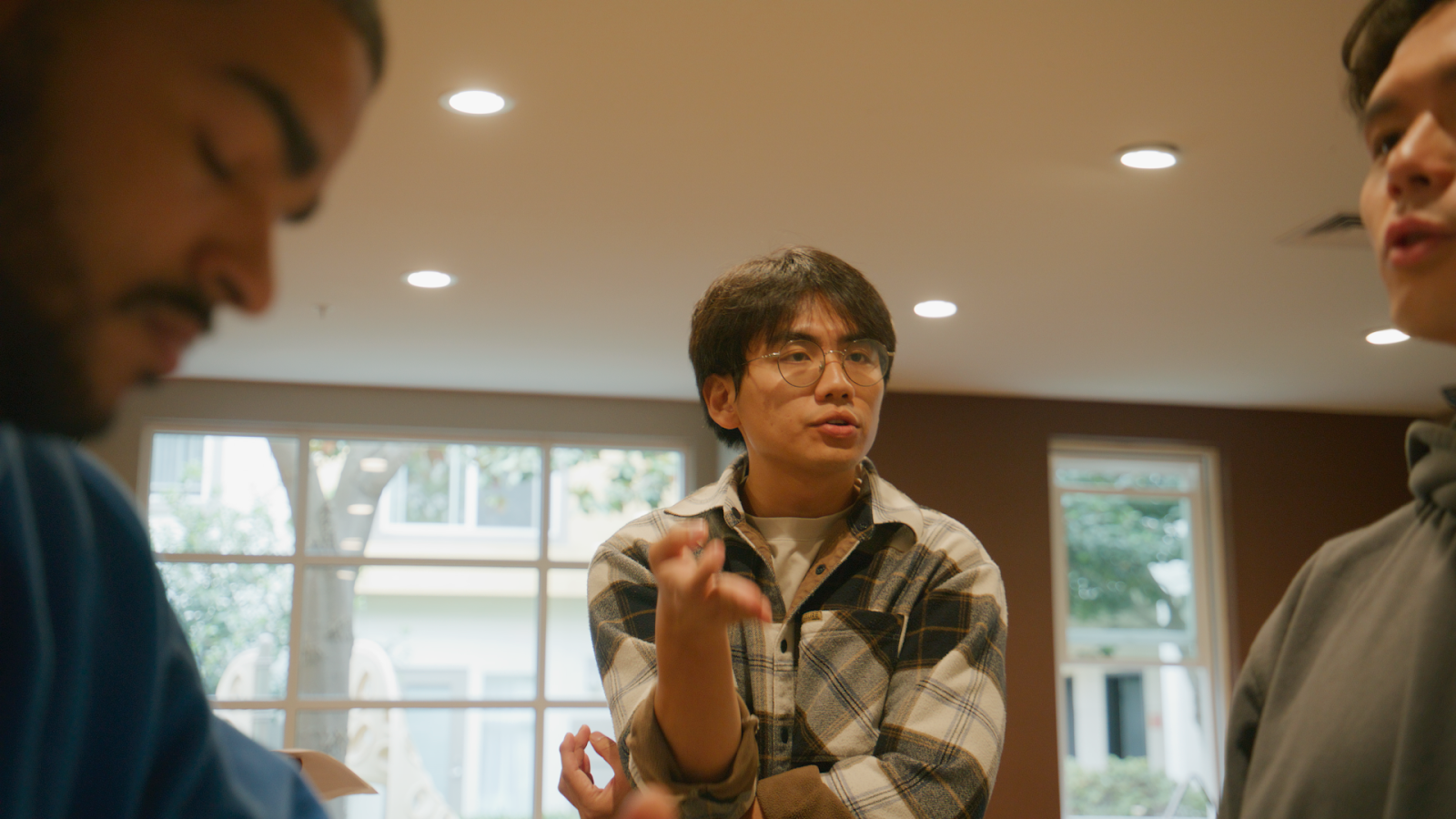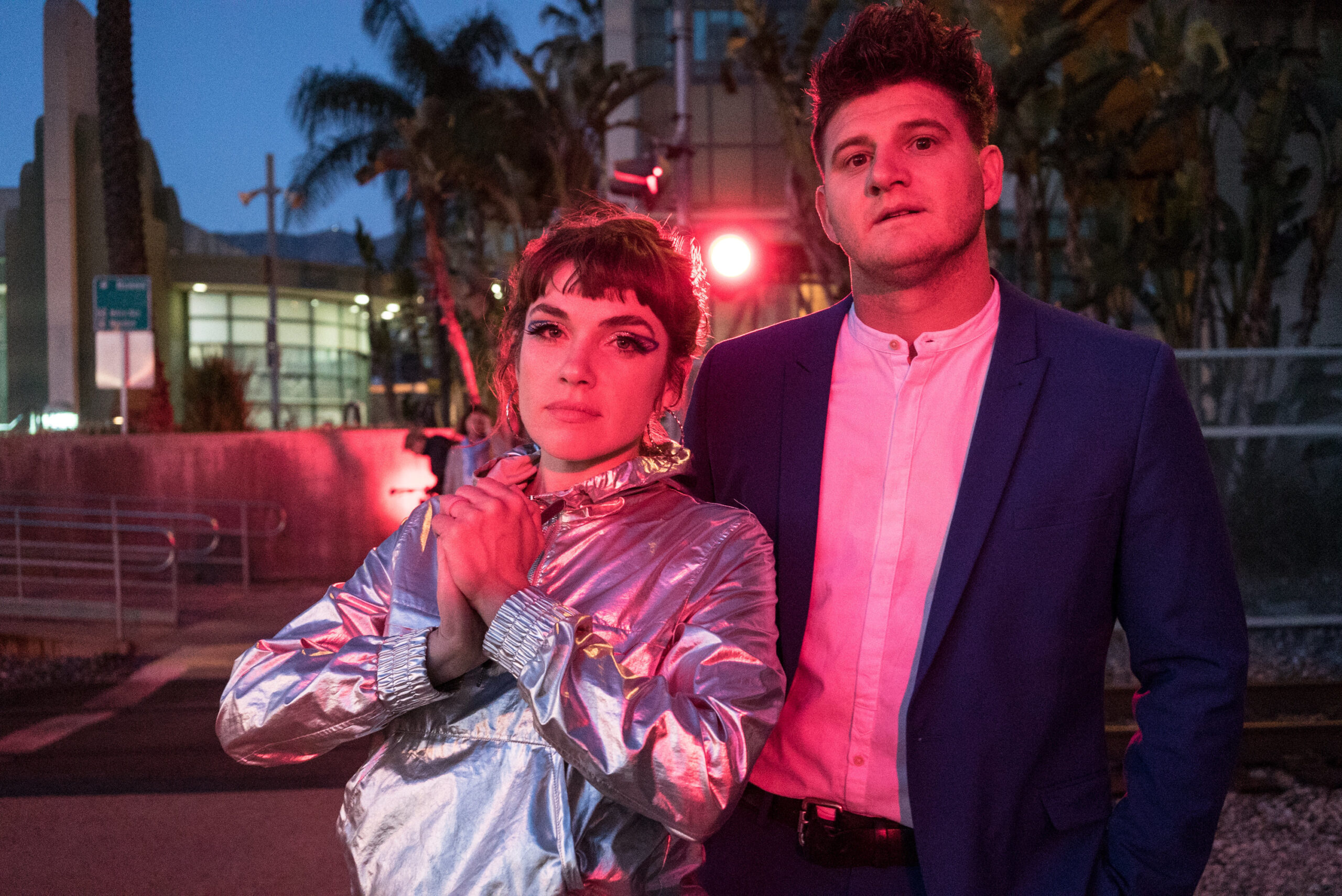
Jen Serena
Loud Forest’s latest single, “Heartbreak Away,” comes from somewhere very raw, an intimate look at the turning gears of a relationship.
The L.A.-based indie-pop duo, Rachel and Bernard Chadwick, have been married for more than a decade, and they’ve been making music for even longer. As partners in life and in creation, their project Loud Forest provides a fascinating look at what collaboration means in music and how those different spaces can collide and coexist. “Heartbreak Away” turns that question into a sumptuous indie-pop feast, with Rachel’s vocals flexing between gentle verses and the anthemic chorus, enveloped by the track’s ascendant production. The lyrics examine sacrifice and honesty in a close space, but it’s to the song’s credit that there are no clear answers given. “Heartbreak Away” isn’t the end of a conversation, it’s more of a portrait of a moment, a realization and revelation of the fragility of love.
Loud Forest sat down with Popdust before the single’s release to discuss their origins, their indie-pop sound, and how they imbue the music with their relationship.
How did Loud Forest begin? What convinced the two of you to come together to make this kind of music?
Bernard Chadwick: We met, like, twenty years ago when we were both really young. Music was a connection point for us. We got married, we’ve been married for fourteen years now, and we’ve been in countless other bands, playing indie, punk, bluegrass. […] Weirdly enough, we’d never really wrote together or played together. At one point, we just decided we wanted to try writing, about three or four years ago, and what came out of it were songs that felt like they connected to who we are. We realized, “This is it.” We kind of think of this as the band to end all bands for us.
Rachel Chadwick: We’ll see. “The band to end all bands.” That should be our band name.
You’ve been aligned in your sound with bands like Bleachers, Saint Motel, and Walk the Moon. What drew you to the sound you work with, and what do you feel that it accomplishes outside of other genres?
RC: I would say that our first album was a lot more rock, more influences of rock and gospel and punk kind of stuff, which I know is totally in us. With our second album, we were working with a good friend helping us produce some stuff [producer Steve Wilmot], and he was kind of shifting us in a pop direction, which has been really fun. He took our rock sound and made it a little more sparkly and polished. For us, it’s less “What genre are we in, and where do we fall in the category,” and more just “What’s fun for us? What feels right?” I feel like we’re in a pop direction right now, although we might swing back in a certain direction. Right now, we’re kind of sitting in indie pop, alt-pop…
BC: Genres aside, I think what’s important for us is the song. We do come from a pretty folky background, so we mostly write songs on acoustic guitar. But as we focus on honing the songs and producing the songs in a way where they’re as clear as they can possibly be, I think the style comes from that process.
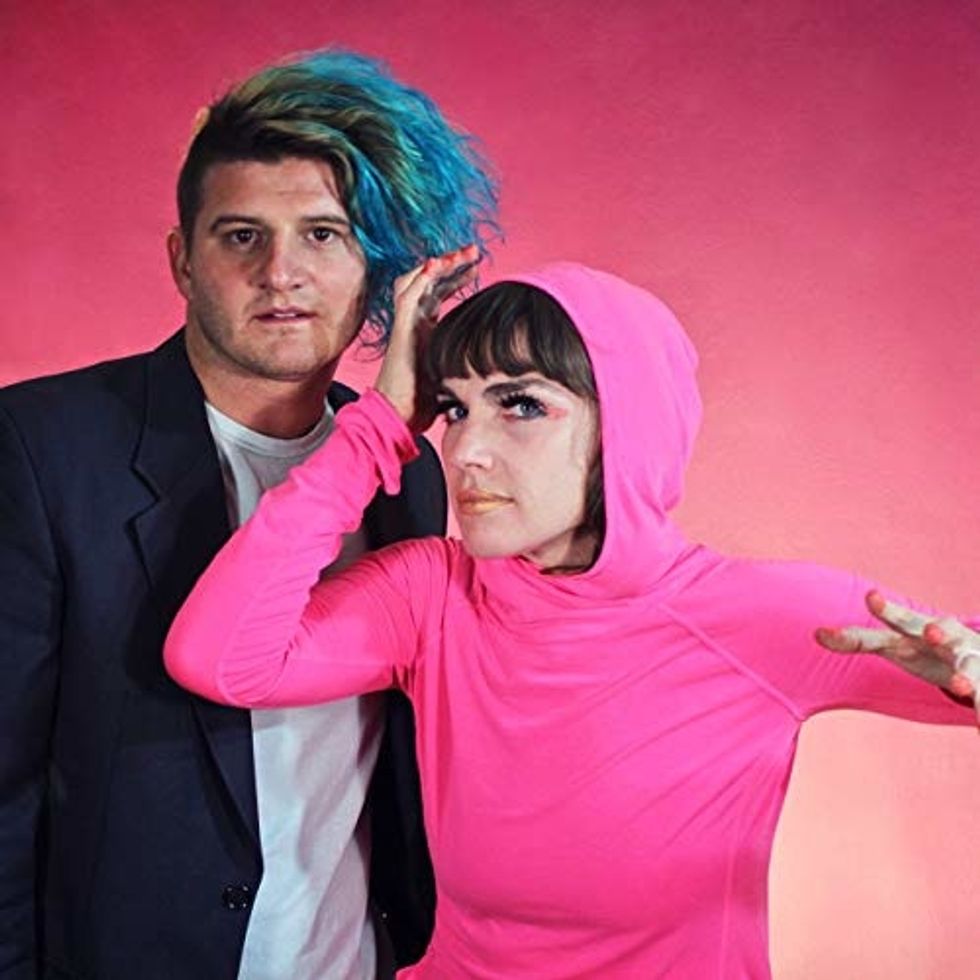 Jen Serena
Jen Serena
What’s your relationship to the word “pop”? Is there a distinction, to you, between the “indie pop” Loud Forest is categorized as, and the larger genre term “pop”?
BC: The word “pop” is changing so much right now, it’s so in flux. It seems like just anything a lot of people listen to is considered to be pop.
RC: Well, it stands for “popular,” right?
BC: Yeah, but there was a time where pop had a sound. And now, that’s becoming less the case.
RC: Because pop is hip-hop, basically.
BC: It’s everything. I would say we’re just trying to write music, and however that gets categorized, fuck it, that’s great. We would love for our music to be heard by as many people as possible, but we’re sure as hell not gonna bend our sound to try and fit into a category, or anything like that. We’re gonna do what’s most honest and genuine to us, and what expresses our creativity the best.
Does your sound now feel experimental, or does it feel like you’ve hit a stride?
BC: I think we’re still experimenting. We really have no idea what we will sound like, even for our next song.
RC: Well, we got a good idea for the next one.
BC: [Laughs] Because for us, our focus is on our voices. Figuring out how two people can sing together on a song and make that work is a huge undertaking already, in and of itself. You don’t really hear a lot of duets in pop music. You hear people trading off and harmonizing. We just sing in unison. That’s kind of always been the focus, and we realized that whether we had electric guitars, bass, and drums, or if we had trap hats and synths and sampled stuff, it still just sounded remarkably cohesive, just because of the way our voices sound.
RC: I don’t know, because this interview is about “Heartbreak Away.,” and that song is one of the first where I sing lead.
BC: That’s true.
RC: That’s a little bit new. It feels subtle, it still feels right in the vein, but…I wrote it, and I was like, “I wanna sing it, dammit. I want this song.”
BC: We had a version where I sing Verse 2, and…
RC: I axed it. [Laughs]
BC: She axed it. It’s cool!
You work out of an experimental art space in Pasadena. What’s the importance to you as artists of having this space to challenge yourselves?
RC: Since we’ve had that space, it’s helped us to conceptualize what “loud” for us can be. We’re really anchored to a space, so having this particular studio space has been really meaningful. It’s an art studio that Bernard paints out of by day, and we record other bands, we host parties and shows, we host other bands or we host our own shows, or we just have band practice there. It’s a multidimensional space that really meant a lot to the recording process. We have a pretty good recording studio set up in there now that we put a lot into, and so we’ve kind of become studio rats. We have our own space to sit and craft.
BC: It’s been a space where we’ve been able to craft not only our sound, but also what Loud Forest looks like, whether that be colors in photographs, or the way that we set up photos or video shoots, graphics, artwork, those kinds of things. It’s an extension of the visual and audible experimentation. Loud Forest is multidimensional, we’re together all the time. We’re not a band that just rehearses and plays shows, we’re married and we have two kids. Every bit is so collaborative.
“Wake Up,” a single off of your 2018 album Please Don’t Disappear, is arguably Loud Forest’s biggest hit, complete with nearly two million hits on Spotify and its own remixes. As a working indie band, how does it feel to have new fans reach you from this fixed point in your work?
BC: Sort of amazing and unexpected.
RC: At first, I didn’t know how that translated into actual fans or people that were authentically engaging with our music. But I think “Wake Up” has been a very sweet interaction with that digital audience. A lot of them have become really strong fans through that song, which has been really cool. A lot of people just kind of start [Loud Forest] on Spotify with a random playlist, and then a lot of people have reached out to us, or started following us and bought merch. It’s been really cool, I’ve seen it turn into an actual physical thing.
BC: People reaching out to us from the Middle East or Indonesia, or people who have heard us in a mall in Pakistan and then Shazamed it? And then found us on Instagram? That’s kind of amazing.
RC: It’s pretty precious! When a teenage girl is like, “I just heard you in Iceland, and now I’m following you and I love you and I’m a major fan.” I’m like, “Oh my Gosh, this is amazing!” […] Social media is such a bitch, right? We’re always like, “Oh, we should post something, blah blah blah, such a pain,” but it really is so beautiful too. It’s amazing for international reach. It’s a love-hate thing. [Laughs]
A good deal of your music deals with the difficulties of intimacy—the sacrifices, the honesty, the communication that it takes to sustain a relationship. When you’re writing for Loud Forest, and creating the music to surround it, where do you as songwriters pull from?
BC: I personally draw a lot from our relationship. The challenges and struggles with intimacy in a relationship are real. It’s interesting, when I’m writing a song, the sad, lonely, alienated feelings are the ones that get me to write. I do start from there, but then as I explore that lyrical theme a little bit more, I find surprising things in there that feel more universal, and can possibly connect to other people. And then beyond that, as we’re working on the music and the melodies and the chord progressions and the palette, I find other discoveries of how that lyrical content about intimacy and alienation can expand and grow and can actually be fun. You know, you put a beat or a soaring melody to something and it makes it not a sad story, but instead a story that has hope and allows you to empathize. Like in “Heartbreak Away,” the way it’s sung is not hopeless, it hopefully draws other people in to be able to experience that story and relate to it.
RC: I write kind of unconsciously. I start writing, and I’m more initially interested in melody to fuel the way I write. I realized on our last album we’re very fifty-fifty, Bernard wrote five songs and I wrote five songs. It just kind of happened that way. At the end of writing a verse and the chorus, maybe a bridge, I sit down to try to finish it, and I’m like, “What is this song about?” And then I can craft from there. But I have to grope through my unconscious, and I can usually say, “Oh, this is about friendship, or this relationship, or this space I was in.” And with “Heartbreak Away…”
BC: Didn’t you say it’s about three different relationships?
RC: Yeah. I had three different moments, working through this feeling of everyone around me falling apart in some way or another, and that being a really intense mirror of my own vulnerability, or lack thereof. The energy of the song, the way the synths and the bass are, I feel like there’s a lot of energy in it, and in that sense I feel kind of joyful about it, even though the title is so sad. [Laughs] I feel some redemption in the element of confronting my own fragility in a communal way, through the lens of other people, and being able to embrace that in a new way.
We took this song, and we were just like, “What is the authentic space for this song to sit in that feels like just the two of us?” Which was totally an epiphany for us. I really wanted to sing this song, that was new for me, that felt tender, that felt fragile for me. [“Heartbreak Away” is] a more vulnerable song, and I felt a conviction of “I want to sing this, I want this to be my song.” But it’s still very Loud Forest. It’s really personal, that’s part of the tender feeling of the song, and I feel really proud of that.
BC: I would add that Rachel has a really tough exterior. She’s a super strong woman…
RC: [Laughs]
BC: …And does not like to be vulnerable. And this song is an exploration of a new awareness and acceptance of her vulnerability.
How does your relationship inform Loud Forest? Do you find yourselves translating those partnerships back and forth?
BC: We’ve had to learn to trust and respect and each other as musicians as a very particular part of our relationship. We’re not gonna tolerate some of the bullshit that you tolerate from other band members that aren’t family. Being in a band, you put up with personalities, it’s’ part of the deal. But with us, that doesn’t quite fly. We have to be totally respectful, totally honest. We do have band fights, or relationship fights, in the studio.
RC: I think we’ve gotten better. I think when we first started, the minimum of respecting each other’s very different styles and how we record, and the fact that Bernard is in [the studio] a lot more than I am, and so when I come in, I’m coming in from such a different angle—we’ve been learning slowly how to communicate in that space, and when to turn off the band talk. We have other things to do. Sometimes, it makes us feel like it’s all we’re doing, and sometimes we just have to go on a date.
How do you want to push your sound in the future? How does “Heartbreak Away” fit into Loud Forest going forward?
BC: Our very first record [Loud Forest, 2017] was super minimal, because that was all we really felt comfortable with. We wanted the songs to be as basic and straightforward as possible, and had a very particular palette we were trying to go for. And then, with Please Don’t Disappear, working with Steve, he really respected that minimalism, while still applying a different palette. And now, we’re getting more confident with building songs, and we’re not afraid of losing the song in the production. I think we have more confidence with fleshing something out a little bit more, and allowing something to be more colorful. I see that as being a potential version of the future for us.
RC: I also think the production of this song is the most I’ve done with production. Please Don’t Disappear was mostly you and Steve doing the pre-production stuff, and then you’d play it for me and go, “What do you think?” And I’d say, “Okay, I don’t like these three things, I love this, just more.” Whereas with “Heartbreak Away,” we were just sitting there doing everything one hundred percent together. So that may be part of it. I don’t feel I know exactly what it is that I’m doing, but I feel like that’s an element. I’m like, “Wait, go back, play that part. Okay, that little spot right there. Oh, there’s a pitch thing there.” Every little second treading the water, I hear it and there are so many tiny things that bug me. And then we fix all the little things, and I’m like, “Okay. There’s something right here that I love, I wanna do that more, I wanna flesh that out.” I don’t know, I just get really picky.
BC: So maybe Rachel is our new producer. [Laughs]
Heartbreak Away
